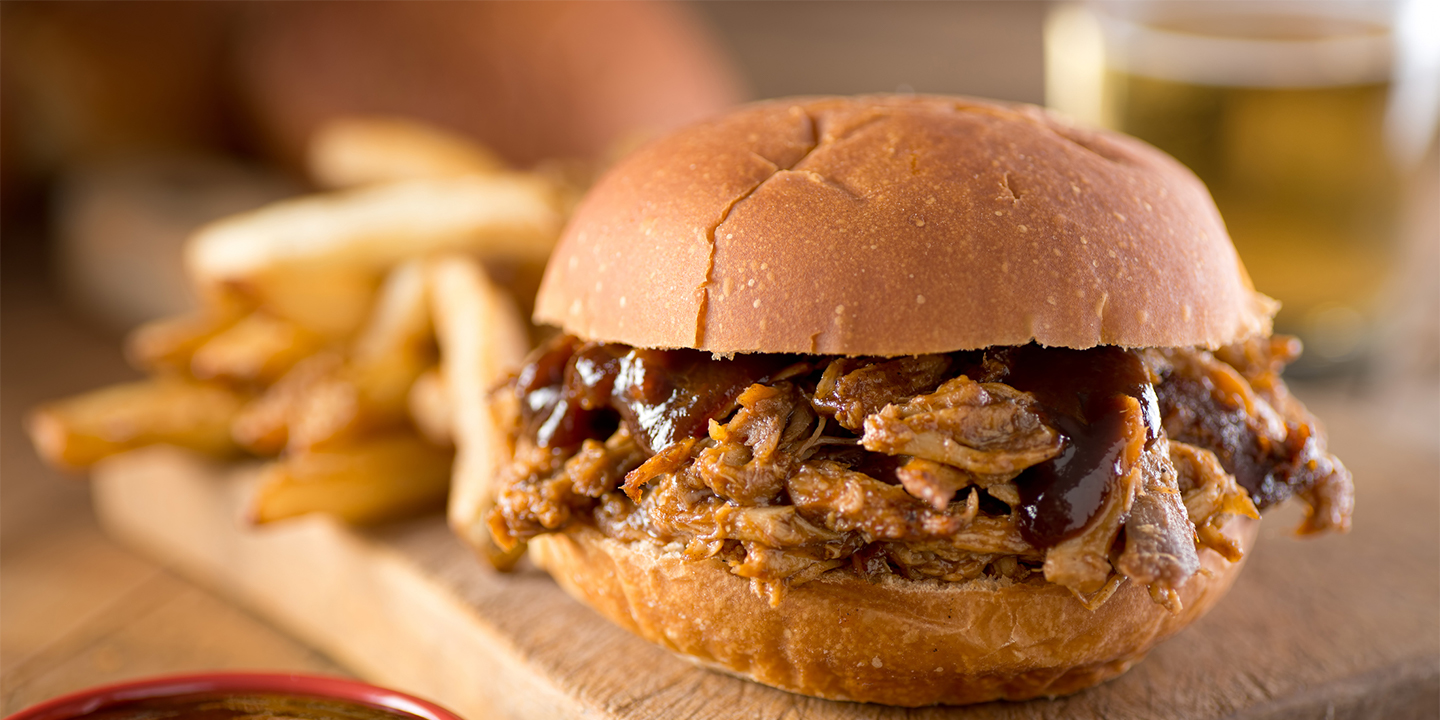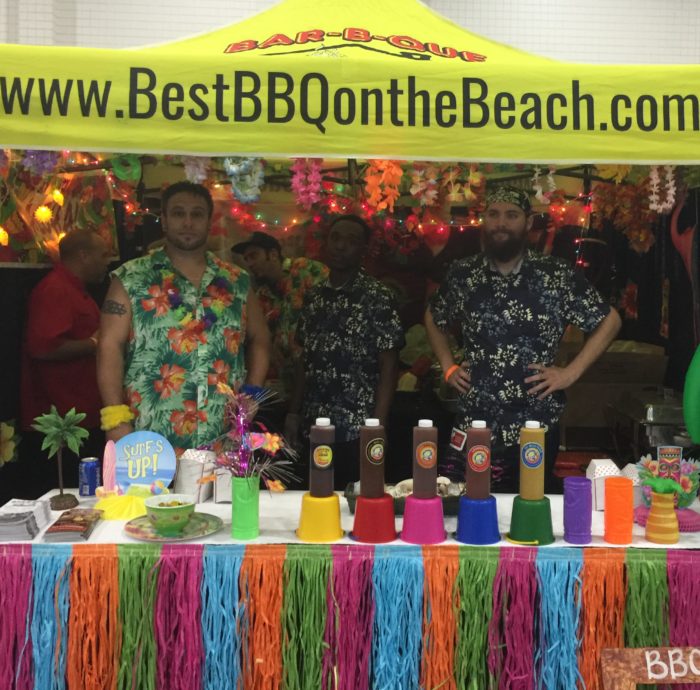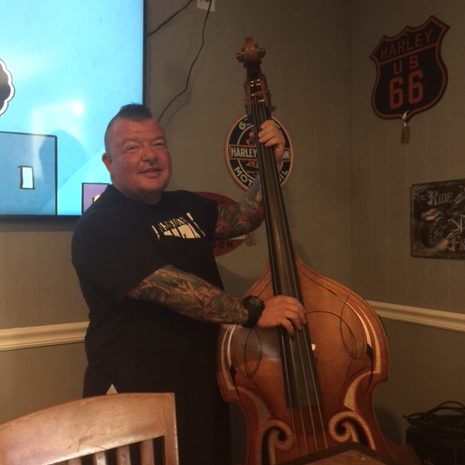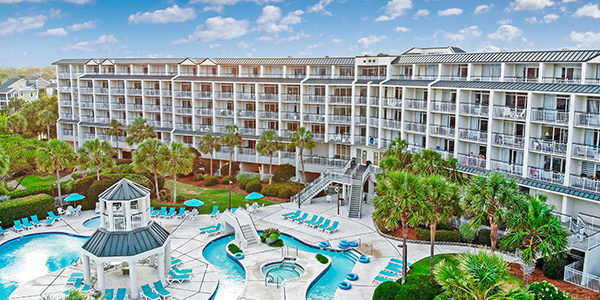
Local BBQ Scene Draws Flavorful Influences from Carolinas and Beyond

The Bar-B-Q House has franchises on both sides of the Carolina border and five sauces to make everybody happy.
Pork, beef or chicken? Pulled, sliced or chopped? Shoulders, whole hog or racks of ribs served in a vinegar-, mustard- or tomato-based sauce?
These are the smoking questions that divide and quarter our nation along well-established barbecue lines, cemented deep in the traditions of each region.
For generations of locals, the BBQ DMZ was as plainly marked as the Carolina border – close enough to enjoy both styles but distant enough to put each other down without starting trouble. For those new to the Pawleys Island area, the nuances are subtle but serious.
The South Carolina tradition is a whole hog slow-smoked over hickory coals until strands of meat are pulled and covered in sauce (that’s another heated debate), while North Carolina smokes pork shoulders (aka butts, huh huh) low and slow over hickory, chops them into tiny pieces and adds a vinegar-and-pepper sauce.
There’s also a split between Eastern and Western Carolina over the particulars of pig parts, sauce bases and whether or not slaw or pickles belong on a BBQ sandwich. There are even some rebellious types who forsake the sacred hickory-wood flavor for other trees.
“Real pit barbecue is hickory smoked low and slow, but even that is up for debate,” said Trent Terry, whose Bar-B-Q House franchises straddle the state line from Surfside Beach to Oak Island, N.C. “Some people use cherry and pecan. We sometimes use apple for a different flavor. It’s really a matter of taste.”
The only common ground shared with our slightly misguided cousins to the North is that the Carolinas are the birthplace of American pit barbecue – not the wet-and-dry ribs of Memphis, nor the beef brisket and baked beans of Texas, and certainly not the syrupy-sweet molasses sauces of Kansas City.
Don’t even get a Carolinian started on Northern barbecue – an oxymoron that ranks right up there with “deafening silence” and “acting naturally.” Up North, barbecue is often used as a verb (as in “Do you’se guys want to barbecue this weekend?”) that usually involves cooking hamburgers and hot dogs on an outdoor grill, perhaps even using (gasp!) propane.
But something funny has happened to the hot-button issue of Southern barbecue in recent years: The battle lines are no longer as clear cut as a state border. Modern Americans are more mobile, traveling and relocating to different parts of the country in record numbers and bringing their BBQ taste buds in tow.
The result is a barbecue fusion that merges traditional styles and methods into a melting pit that smells and tastes more like America. Fortunately for folks in the Pawleys Island area, you don’t have to follow your noses far to find it.

Joe Fuqua of Pop Pops BBQ in Murrells Inlet plays the bass during a break from making barbecue. His sauce recipe is tattooed on his forearms.
Bicoastal BBQ
Whether it’s barbecue, biking or thumping on his stand-up bass, Joe Fuqua has his own unique style. He got it honest, attending barbecue schools (yes, there is such a thing) and competing in cookoffs from coast to coast before settling down to open Pop Pop’s Pit BBQ. His second location sits in the heart of Murrells Inlet’s seafood district.
“I learned the fundamentals from some of the best in the business, but you develop your own ways over time,” said Fuqua, who splits time between running Pop Pop’s, riding his Harley and holding impromptu jam sessions with local musicians. “A lot of it’s trial and error. The more times you do it the more you learn. We’ve won competitions in all kinds of categories – brisket, pulled pork, chili, chicken bog.”
Fuqua, a Maryland native, got his start in an unlikely place for a pitmaster – Phoenix, Arizona. He learned his craft on the West Coast, where beef brisket is preferred to pull pork and sweet sauce instead of spicy. But after mastering his craft in national competitions, he decided it was time to put his trial-by-fire education to the test in the Southeast.
“In competitions you have to be able to do everything well, and that really prepared me for running a restaurant,” Fuqua said. “Everybody has their own tastes and their own ideas about what’s good barbecue. We make it so good that everybody from a 5-year-old to a grandmother to a barbecue nerd will like it.”
Fuqua makes his own house sauce (the secret recipe is tattooed on his forearms if you can decipher it), and he is willing to share one secret about the type of wood he uses to fuel his roadside smoker – a mix of apple and pecan as opposed to hickory, a near-consensus in the South. The rest you will have to learn the hard way.
“I’ll go head to head with anybody,” said Fuqua, who considers brisket his specialty but doesn’t shy away from any culinary challenge. “Let’s do it.”

Moe`s Original BBQ in Pawleys Island provides the perfect atmosphere for enjoying the outdoors and the aroma of hickory smoke.
Moe’s Knows ‘Cue
Meg Lonon is a barbecue traitor, if there is such a thing. Growing up in Tennessee, which is ranked the No. 1 state for barbecue by TripAdvisor, Lonon crossed the southern border to attend the University of Alabama and also received an education in the art of smoked meats. She was converted in the ways of ‘cue.
“Alabama-style barbecue is very similar (to Tennessee and the Carolinas) in that we smoke our butts low and slow,” said Lonon, proprietor of Moe’s Original BBQ in Pawleys Island. “The biggest difference is the sauce. Our Alabama Red Sauce is tomato-based instead of the vinegar or mustard sauces that a lot of people here are used to.”
But the Alabama Red Sauce is not the concoction that raises the most eyebrows at Moe’s. That’s the Alabama White Sauce, a creamy mayonnaise-based recipe that some barbecue snobs consider blasphemy – until they taste it. Intended for use with Moe’s smoked chicken, converts put it on pork, ribs, turkey, smoked sausage and occasionally in their purses.
“Sometimes they turn their noses up when they first hear about it, but once we get them to try it they keep coming back for more,” Lonon said. “It’s very popular on our poultry products but people put it on everything. We have people stealing it off the tables.”
Moe’s also breaks from Southeastern establishment by serving St. Louis-style pork spare ribs, which come with a sweet and tangy sauce. It’s also is one of the few BBQ joints to specialize in whole smoked turkeys, which Moe’s will be selling for the holidays.
Mayo sauce or not, serving smoked turkey for Thanksgiving is about as traditional as it comes.

Pop Pop`s BBQ`s portable smoker is always ready to hit the road for barbecue competitions.
Hundred-Mile BBQ
The best barbecue is literally hard to find, so says the South Carolina Barbecue Association’s 100 Mile BBQ list. These restaurants serve barbecue so good it’s worth driving 100 miles to taste it. The back roads of Georgetown and Williamsburg counties had a couple of hideaways make the cut.
If you have the time and gas money, go in search of Riverside Bar-B-Que in the Oatland community. Travel down Browns Ferry Road, turn down an unmarked path by the Greater St. Paul Church and follow your nose to a small shack that sits on the banks of the Black River. Open only Fridays and Saturdays, Riverside requires some effort to find but rewards you handsomely.
Make a slightly longer trip to Hemingway to visit the world-famous Scott’s BBQ, which has been featured in the Washington Post and CNN’s “Anthony Bourdain: Parts Unknown.” Once you wrap your brain around the fact that it’s an old convenience store with a smokehouse out back, enjoy the best in traditional South Carolina Lowcountry barbecue in a vinegar and pepper sauce that customers carry home by the trunkload.
That isn’t to say you can’t find good traditional Carolina barbecue styles (North, South, East and West) in the Pawleys Island area without having to go the extra mile. In fact, just a couple of blocks from Pop Pop’s is Prosser’s BBQ, a family-owned outfit that has been serving South Carolina-style barbecue and country cooking since 1953.
Just south of Pawleys Island, Hog Heaven serves a bountiful buffet featuring seafood, country cooking and barbecue, including pulled pork, ribs and chicken. In Georgetown, Herb’s BBQ & Seafood and Big Bill’s Lowcountry Bar B Que offer traditional Southern BBQ and sides. And in Surfside Beach, the Bar-B-Q House boldly boasts the domain name BestBBQontheBeach.com.
The title is, after all, a matter of taste.
“We make it with real hickory flavor and offer five different sauces so people can pick their favorite,” said Terry, whose barbecue most closely compares to Lexington, N.C.-style. “Some like it sweet, some like it spicy, and others with no sauce at all. I’m from Columbia so I prefer the mustard sauce. It’s really up to the individual.”
